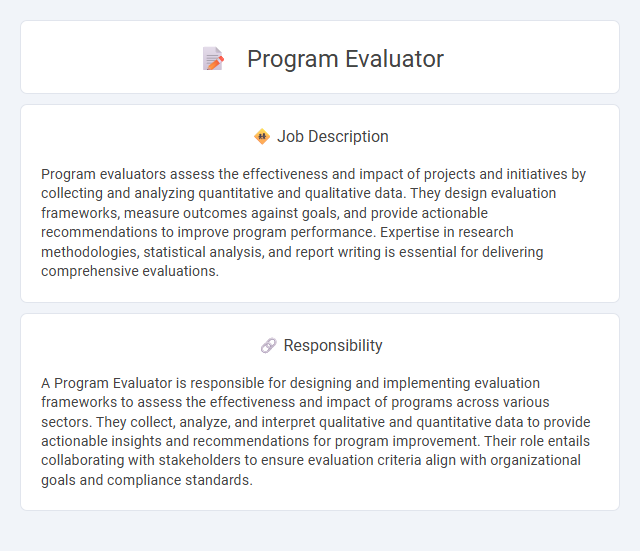
Program evaluators assess the effectiveness and impact of projects and initiatives by collecting and analyzing quantitative and qualitative data. They design evaluation frameworks, measure outcomes against goals, and provide actionable recommendations to improve program performance. Expertise in research methodologies, statistical analysis, and report writing is essential for delivering comprehensive evaluations.
Individuals who possess strong analytical skills, attention to detail, and a passion for assessing program effectiveness are likely suitable for a program evaluator role. Those comfortable working with data, conducting qualitative and quantitative research, and providing constructive feedback could find this job fulfilling. People who prefer routine tasks or lack critical thinking abilities may struggle to meet the demands of this position.
Qualification
A Program Evaluator possesses expertise in research methods, data analysis, and performance measurement to assess the effectiveness of programs across various sectors. They typically hold a bachelor's or master's degree in fields such as social sciences, public administration, or statistics, complemented by strong skills in qualitative and quantitative evaluation techniques. Proficiency in software tools like SPSS, R, or NVivo and the ability to communicate findings clearly to stakeholders are essential qualifications for this role.
Responsibility
A Program Evaluator is responsible for designing and implementing evaluation frameworks to assess the effectiveness and impact of programs across various sectors. They collect, analyze, and interpret qualitative and quantitative data to provide actionable insights and recommendations for program improvement. Their role entails collaborating with stakeholders to ensure evaluation criteria align with organizational goals and compliance standards.
Benefit
A program evaluator is likely to experience significant benefits including enhanced analytical skills and a deep understanding of project effectiveness. This role often offers opportunities for career growth and specialization in various industries such as healthcare, education, or nonprofit sectors. The probability of gaining valuable insights that influence strategic decision-making may also increase job satisfaction and professional impact.
Challenge
Program evaluators likely face the challenge of analyzing complex data sets to assess the effectiveness of various projects accurately. They probably need to navigate the difficulties of balancing stakeholder expectations with objective evaluation criteria. The role may frequently demand adaptability to changing program goals and the ability to synthesize qualitative and quantitative information under tight deadlines.
Career Advancement
A Program Evaluator plays a crucial role in assessing the effectiveness of projects and initiatives, using qualitative and quantitative data to drive informed decision-making. Mastery of evaluation methodologies, data analysis tools, and understanding stakeholder needs opens pathways to senior roles such as Evaluation Manager or Director of Program Assessment. Continuous professional development and specialization in sectors like healthcare, education, or government enhance career advancement opportunities and salary potential.
 kuljobs.com
kuljobs.com